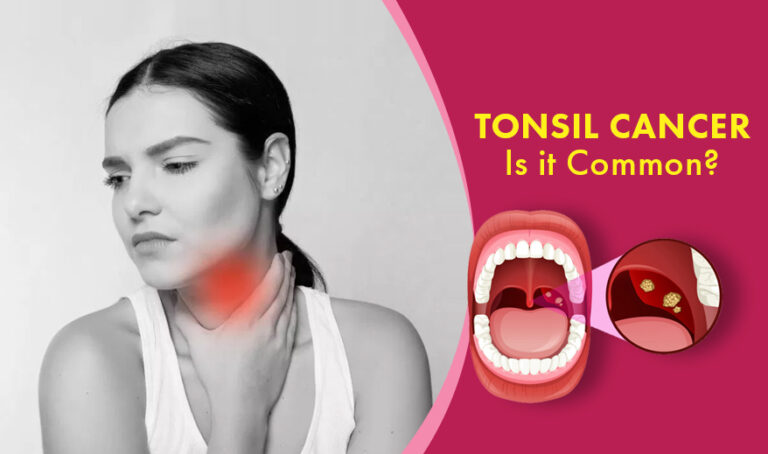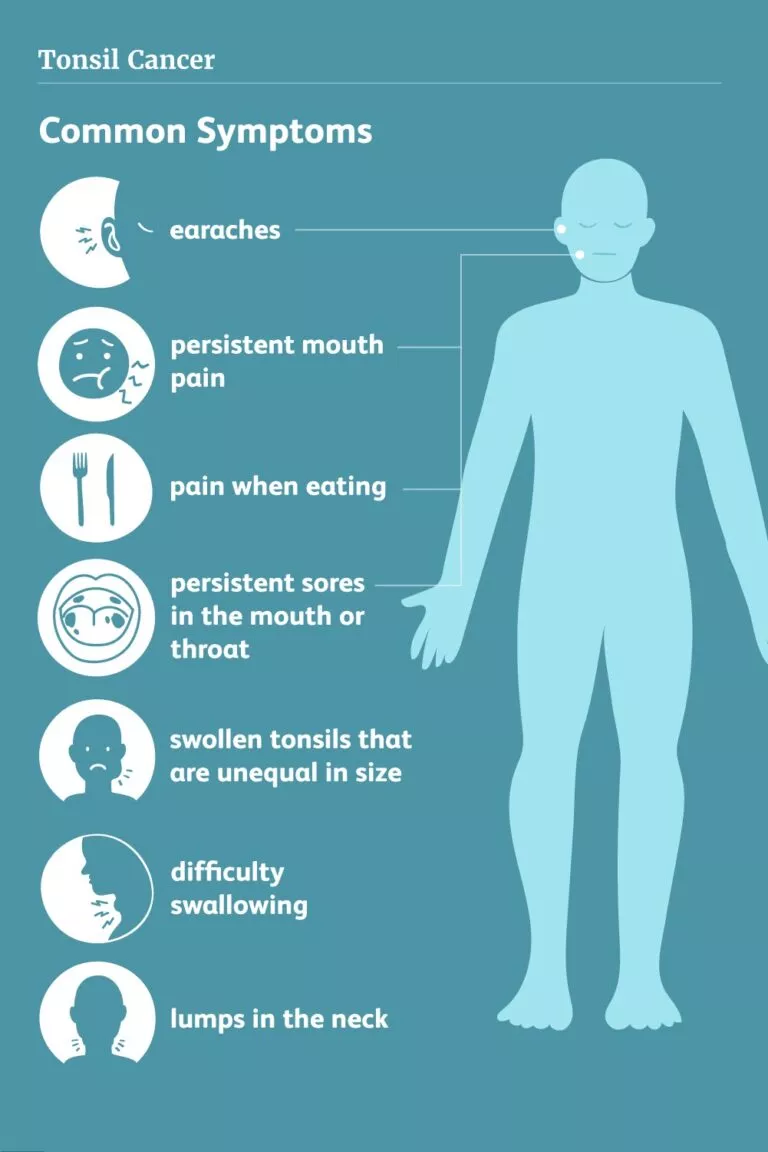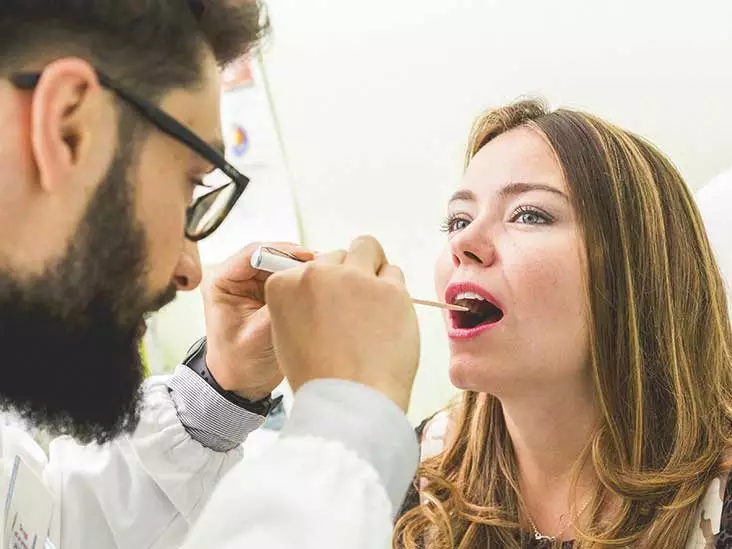TONSIL CANCER – SYMPTOMS, CAUSES, AND TREATMENT
Tonsil cancer is an abnormal growth of cells that develops in a tonsil. Your tonsils are two oval-shaped pads at the back of your mouth that are part of your body’s germ-fighting immune system.

Tonsil cancer could cause difficulty swallowing and a sensation that something is caught in your throat. Tonsil cancer is often diagnosed late in the disease, when cancer has spread to nearby areas, like the lymph nodes in the neck.
Treatments for tonsil cancer involve surgery, radiation therapy, and chemotherapy.
SYMPTOMS
Signs and symptoms of tonsil cancer include:
- Difficulty swallowing
- A sensation that something is caught at the back of your throat
- Swelling and pain in the neck
- Earache
- Jaw stiffness
WHEN SHOULD YOU SEE A DOCTOR?
Schedule an appointment with your doctor or dentist if you have any persistent signs and symptoms that concern you.

CAUSES
Tonsil cancer develops when healthy cells in the tonsils develop changes in their DNA. A cell’s DNA consists of the instructions that tell a cell what it should do. The changes tell the cells to grow out of control and to continue living when healthy cells would generally die. The accumulating cells form a tumor that could grow beyond the tonsils and spread to other areas of the body.
It is not clear what causes tonsil cancer, but doctors are finding that human papillomavirus (HPV) is increasingly playing a role. This common sexually transmitted infection is found in most tonsil cancers in the United States. Tonsil cancer caused by HPV tends to happen at a younger age and is more likely to respond well to available treatments.
RISK FACTORS
Factors that might increase the risk of tonsil cancer include:
- Using tobacco
- Drinking alcohol
- Being infected with human papillomavirus (HPV)
PREVENTION
To reduce your risk of tonsil cancer:
- Do not use tobacco – If you do not use tobacco, do not start. If you currently use tobacco of any kind, speak with your doctor about strategies to help you quit.
- Limit alcohol if you choose to drink – If you choose to drink alcohol, do it in moderation. For healthy adults, that means up to 1 drink a day for women and up to 2 drinks a day for men.
- Get regular dental care – During your appointment, your dentist will examine your mouth for signs of cancer and precancerous changes.
- Consider the HPV vaccine – Receiving a vaccination to prevent HPV infection might reduce your risk of HPV-related cancers, like tonsil cancer. Ask your doctor whether an HPV vaccine is right for you.
DIAGNOSIS
Tests and procedures used to diagnose tonsil cancer are:
- Examining your throat and neck – Your doctor will use a mirror or small camera to examine your mouth and throat. The doctor might use his or her hands to feel your neck to check for enlarged lymph nodes.
- Removing a tissue sample for testing – Your doctor will remove an area of the suspicious tissue and send it to a laboratory for testing. In the laboratory, specially trained doctors (pathologists) will look for signs of cancer. The tissue sample will also be tested for HPV since the presence of this virus highly impacts your prognosis and your treatment options.
- Taking imaging tests – To better understand the size of your cancer and to look for signs that cancer might have spread beyond your tonsils, your doctor might recommend imaging tests, like computerized tomography (CT), magnetic resonance imaging (MRI), and positron emission tomography (PET).
Your doctor uses this information from these procedures to assign your cancer a stage. The stages of tonsil cancer range between 0 and IV. The earliest stages indicate small cancer that might be confined to the tonsil or might have spread to a few nearby lymph nodes. Later stages suggest more-advanced cancer that has grown to involve many lymph nodes or has spread to other areas of the body.

TREATMENT
Which tonsil cancer treatments are best for you will depend upon the size, stage, and HPV status of your cancer, as well as your overall health and your preferences. Tonsil cancer treatment options might include surgery, radiation therapy, or a combination of chemotherapy, and radiation therapy.
Researchers are studying whether people with HPV-associated tonsil cancer could be treated with lower doses of radiation and chemotherapy. This less intense treatment causes fewer side effects and, in early studies, appears to be as effective as higher doses. If your tonsil cancer is found to be HPV-associated, you and your doctor may consider a clinical trial studying less intense treatments.
Surgery
The aim of surgery for tonsil cancer is to remove as much cancer as possible. Surgery could be used to treat all stages of tonsil cancer.
Surgery is most frequently done through the mouth (transoral surgery). Surgeons pass specialized tools by mouth to access cancer and remove it with cutting tools or lasers.
In specific situations, it might be necessary to make a large incision in the neck to remove larger cancers and cancers that have spread to the lymph nodes. Reconstructive surgery and rehabilitation might be needed to restore your ability to eat, speak, and swallow.
Radiation therapy
Radiation therapy uses high-powered beams of energy, like X-rays or protons, to kill cancer cells.
Radiation therapy may be used alone to treat small cancers that have not grown beyond the tonsil. Sometimes radiation therapy is used after surgery if cancer cannot be removed completely or if there is a risk that cancer might have spread to the lymph nodes.
Radiation could also be combined with chemotherapy as an initial treatment or as an additional treatment after surgery. The chemotherapy makes the cancer cells more susceptible to radiation and might increase the effectiveness.
Chemotherapy
Chemotherapy makes use of drugs to kill cancer cells. For tonsil cancer, chemotherapy is generally combined with radiation therapy. It could also be used alone to slow the growth of tonsil cancer that has recurred or has spread to other areas of the body.
Rehabilitative services
Rehabilitation specialists in speech therapy, swallowing therapy, dietetics, physical therapy, and occupational therapy help with rehabilitation that might be necessary after surgery or radiation therapy.
If you or anyone you know is suffering from tonsil cancer, our expert providers at Specialty Care Clinics will take care of your health and help you recover.
Call us on (469) 545-9983 to book an appointment with our specialists.
